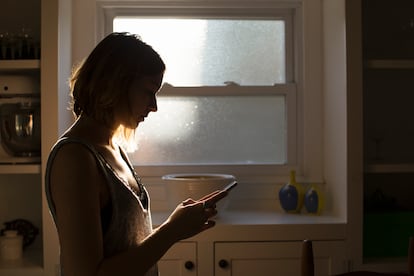‘Why am I not getting any matches? Am I too fat?’ How dating apps promote self-esteem issues
A Harvard study reveals that people who use matchmaking applications are more likely to develop eating disorders

Marta Górnicka, 29, remembers how she used to give money to her friends at school so they would tell her parents that she ate. “The truth is that I only ordered a salad. I used to write ‘Think about the fat people’ in my notebooks, so as to force myself not to eat, even if I was hungry.” Several years after beating her eating disorder, this year she once again felt the need to stop eating and exercise constantly. The trigger? A dating app.
Matchmaking applications can promote eating disorders. At least, this is what the most recent reports on the matter indicate; in a study published in 2017 in the Body Image journal, for instance, they compared body image problems between Tinder users and non-users. “Tinder users, regardless of gender, reported significantly lower levels of satisfaction with face and body and higher levels of internalization, appearance comparisons, and body-shame and surveillance than non-users,” says the article, which highlights that the problem occurs at the moment of swiping, when, in a matter of seconds, a person is rejected for their image.
Users “may begin to (a) feel depersonalized in their social interactions, with the focus being primarily on sex; (b) develop a heightened awareness (and criticism) of their bodies; and (c) believe that there is always something with the next swipe of their screen, even while questioning their own worth,” states the report.
This is what happened to Paloma Martínez, who in search of the man of her dreams opened a Tinder account last year. Suddenly, the love that had been hiding for so long was a swipe away. Like her, more than 90 million users today use dating applications to find their better half. On Tinder, the most downloaded love platform in the world, 25% of users are women, with an average age of 26 years.
Martínez uploaded what she considered to be her best photos, but nothing happened. Sometimes she got a like, maybe even the odd match, but after a few days those men she connected with stopped talking to her without any explanation. “Then I wondered: why am I not getting any matches?” she recalls. “Could it be my body? Am I too fat?” She began to be burdened by all these doubts, which did nothing but lower her already damaged self-esteem.
A Harvard School of Public Health article titled Dating app use and unhealthy weight control behaviors among a sample of U.S. adults: a cross-sectional study found to what extent users of apps like Tinder are more likely to put their health at risk in order to lose weight and fit into the prevailing beauty canon. The report evaluates the cross-sectional association between dating app use and six unhealthy weight control behaviors such as fasting, diet pill use, laxative use, self-induced vomiting, the use of muscle-building supplements and the use of anabolic steroids. The conclusion is that people who use dating apps are 2.7 to 16.2 times more likely to develop an eating disorder.
For Zara Casañ, psychologist and teacher at the Carlemany University (Andorra), this study makes perfect sense, because these applications can cause “a lot of social anxiety, that is, an intense and persistent fear of being observed and judged by others.” Casañ points out that Tinder, like all other dating apps, is a showcase where people are exposed and judged, often by a single image.
Carmen Acosta, 31, has always felt that her physique can work against her when it comes to flirting on apps: “I grew up thinking that no one was going to love me, that I wasn’t going to be desired by a man until I was skinny. I had to be just like the models in the magazines.”
Tinder is aware that its app can affect a self-esteem that is linked to the physical appearance and mental health of its users. That is why, together with the health psychologist and self-esteem expert Marta Ridaura, in Spain, the platform organized Match Care, a free workshop where they talked about limits and good practices when establishing safe and healthy relationships. Ridaura explains that being on a dating app “can affect mental health,” whether a user has a normative body or not. That is why, when entering the world of dating apps, you have to ask yourself if you are prepared to accept the emotions associated with rejection.
“We are victims of beauty standards”
For Cristina Luzón Collado, director of the Ohana Psychology and Psychoeducational Care Center in Madrid, Spain, this is a cultural issue, and Tinder is a reflection of society. Luzón places great emphasis on the fact that there has always been more pressure on women’s bodies and the standards they have to meet: “Even though taste is totally subjective, we are victims of beauty standards.” She says many patients come to her office concerned about the pressure they feel regarding their bodies on dating apps. On many occasions, these women decide to leave the app, or not creating an account at all, because they believe they will be rejected. “A self-fulfilling prophecy effect can occur: if you go in thinking about possible rejection and expectations are not met, the experience can only fail.”
Psychologist and clinical sexologist Luis Tejedor explains that in his practice they prepare their patients to learn to manage dating applications well. “We teach them to choose their most authentic photos, so that their self-esteem is not compromised. You have to be aware of the exposure and get ahold of all the tools to learn how to play that game,” explains Tejedor.
Alba Duran, marketing director at Bumble Spain, points out that this includes blocking or banning the users who body-shame, that is, those who pick on others due to their physical appearance. “We always seek to educate and give our community the opportunity to learn to recognize this language and improve. However, we do not hesitate to permanently ban someone from the app if they make such comments.”
To detect this type of behavior, the app uses automatic security measures to find comments and images that go against its guidelines and terms and conditions, which are then forwarded to a human moderator for review.
Sign up for our weekly newsletter to get more English-language news coverage from EL PAÍS USA Edition
Tu suscripción se está usando en otro dispositivo
¿Quieres añadir otro usuario a tu suscripción?
Si continúas leyendo en este dispositivo, no se podrá leer en el otro.
FlechaTu suscripción se está usando en otro dispositivo y solo puedes acceder a EL PAÍS desde un dispositivo a la vez.
Si quieres compartir tu cuenta, cambia tu suscripción a la modalidad Premium, así podrás añadir otro usuario. Cada uno accederá con su propia cuenta de email, lo que os permitirá personalizar vuestra experiencia en EL PAÍS.
¿Tienes una suscripción de empresa? Accede aquí para contratar más cuentas.
En el caso de no saber quién está usando tu cuenta, te recomendamos cambiar tu contraseña aquí.
Si decides continuar compartiendo tu cuenta, este mensaje se mostrará en tu dispositivo y en el de la otra persona que está usando tu cuenta de forma indefinida, afectando a tu experiencia de lectura. Puedes consultar aquí los términos y condiciones de la suscripción digital.









































